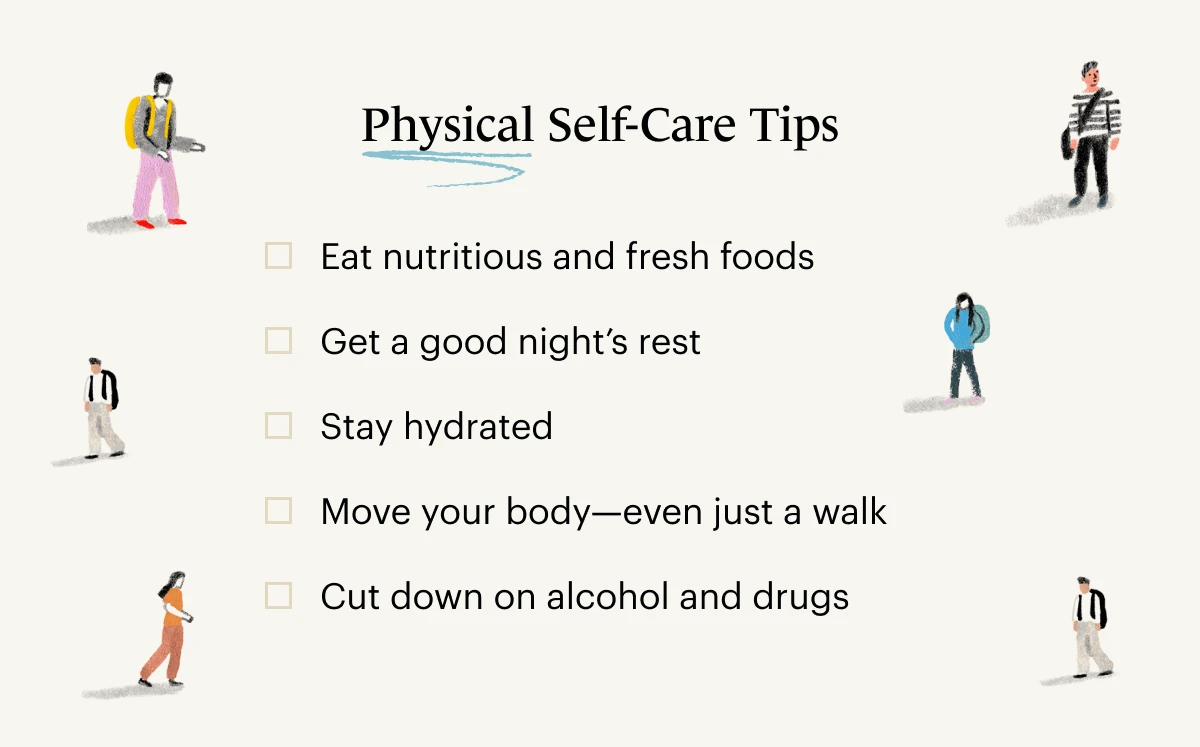It’s not only physical wellness that contributes to our bodies’ ability to thrive—mental health is essential to ensuring overall health. And self-care routines have been shown to contribute to our mental health and physical health.

Why mental health and emotional health are crucial to care for
With mental wellness, we’re able to cope with the normal stress and conflicts in our lives, be productive members of our families, communities and in society, and—importantly—realize our full potential.
And—it needs to be mentioned—there can be a significant downside when our emotional health is compromised.
When we don’t have good mental health, our abilities to function, think, emote, interact with others, earn a living, and enjoy fulfilling lives are put at risk.
Those are basically all the things, right?
Self-care practices can help us protect our mental and emotional health.
Living in a world where discussing and being open about mental health issues can be stigmatized or swept under the rug makes it extra-important for each of us to prioritize our own medical and therapeutic care and self-care in support of our physical and mental well-being.
Since the beginning of the COVID-19 pandemic in early 2020, many people have experienced what’s being called “COVID trauma" from being isolated in their homes, limited in their ability to travel, and restricted from seeing immune-compromised family members.
Issues related to mental health have been exposed now more than ever.
Grief, stress, and depression—for instance—can increase the risk for many types of chronic disease, particularly conditions like diabetes, heart disease, and stroke.

Self-care practices support mental health
Self-care is beneficial to our physical, emotional, psychological, and mental health.
A 2018 study of U.S. medical students found that those who engage in self-care report less stress and higher quality of life. It can even help to prevent burnout.
Along with professional medical and therapeutic care, prioritizing our own self-care practices and routines can be a positive way to nurture our mental health.
The key to reducing the chances of suffering from the long-term health impacts of stress is developing good healthy habits and practicing stress management techniques.
Let’s explore how we can use self-care to support our emotional and psychological health.
Consider starting, restarting, or recommitting to your own self-care routine after consulting the checklists we’ve created below.
What causes mental illness?
A number of factors can put each of us at risk for mental illness.
According to The Centers for Disease Control (CDC), these factors include:
Early adverse life experiences, such as trauma or a history of abuse (for example, neglect, sexual assault, witnessing violence, child abuse, etc.)
Experiences related to other ongoing (chronic) medical conditions, such as cancer or diabetes
Biological factors or chemical imbalances in the brain
Use of alcohol or drugs and addiction
Feelings of loneliness or isolation
Additional factors that can negatively influence mental stability and health are:
Long-term and/or severe stress
Grief and bereavement
Discrimination
Long-term physical conditions
Social disadvantages
Poverty or significant debt
Sudden job loss/extended unemployment
A breakup or divorce
Dysfunctional and unstable family life

How common are mental illnesses in America?
According to the CDC, mental illnesses are among the most common health conditions in the United States.
Some (potentially) surprising statistics:
More than 50% of Americans will be diagnosed with a mental illness or disorder at some point in their lifetime. (Depression, anxiety, phobias, ADHD, obsessive-compulsive disorder aka OCD, bipolar disorder, post-traumatic stress disorder aka PTSD, or schizophrenia)
1 in 5 Americans will experience a mental illness in any given year.
1 in 5 children, either currently or at some point during their life, have had a seriously debilitating mental illness.
1 in 25 Americans are living with a serious mental illness, such as schizophrenia, bipolar disorder, or major depression.
Given these numbers, half of us will experience mental health issues at some point in our lives.
You’re not alone in facing the daunting task of identifying and addressing mental illness.
We now live in a world where athletes like Naomi Osaka, Simone Biles, and Alexi Pappas have demonstrated that prioritizing their own mental health can be an important enough reason to take time away from competing in their respective sports.
This is significant progress, however we still have more work ahead of us.
Here are some steps we can take.
5 types of self-care for mental health
The five types of self-care are physical, emotional, psychological, social and spiritual, and professional care.
Making time for each can help you to protect your mental health—and keep your mind, body, and spirit in balance.

1. Physical self-care tips checklist
Sleeping well, getting regular physical activity and exercise, caring for your body’s needs, and eating nutritious fresh foods are all part of physical self-care.
Going to regular doctor’s check-ups, taking medication as prescribed, and actively playing a role in managing your health, are all also part of good physical self-care.
Physical health can improve your mental health so keep these practices on your checklist:
Eat nutritious and fresh foods. Prioritize vegetables and fruits, along with whole grains and lean protein. Aim to eat the 10 best foods for mental health.
Make sure you're getting a good night’s rest. Sleep issues, such as insomnia, are correlated with negative mental health impacts.
Stay hydrated. Aim to drink 6-8 glasses of water per day, depending on how active you are.
Move your body–even if just for a walk around the yard or block. Regular physical activity helps decrease depression and anxiety and improve moods
Be mindful of consumption, cut down, or avoid alcohol and other drugs. People may use booze and recreational drugs to "self-medicate" and numb negative thoughts, however alcohol and drug use can actually have the opposite effect—amplifying those feelings or masking the sources of our emotions. Additional negative long-term effects can also include addiction and damage to our internal organs.
2. Emotional self-care tips checklist
Emotional self-care may include activities that help you acknowledge and express your feelings regularly and safely.
Finding positive ways to focus your energy will help you to deal with your emotions.
Value yourself. Treat yourself with kindness, respect, and self-compassion. Try to avoid negative self-talk. Carve out time in your schedule for your projects, hobbies, and things that bring you joy. Broaden your horizons. Take a long walk, plant a garden, take a woodworking class, learn to play an instrument or a new language, or volunteer in your community.
Use techniques to manage your stress. Alas, stress is a normal part of being human. Coping with stressful times can be mitigated by prioritizing beneficial self-care habits: Breathing exercises, mindfulness-based therapy (MBT), meditation, yoga, dancing, Tai Chi, exercise, taking a nature walk, journal writing, and/or playing with a pet can all be excellent ways to ease your mind.
Be open to trying something new. Make opportunities to change up your usual routine. Variety can spark joy when you add something new to the schedule you normally follow. Go on a picnic (or simply enjoy a meal outdoors), rearrange your bedroom, try a new recipe, dine at a new restaurant, and/or thank your mail carrier or FedEx delivery person and strike up a quick conversation.
3. Social self-care tips checklist
Keep a circle of friends and family members you trust and talk with regularly.
People with strong family and/or social connections are typically found to be physically and mentally healthier when compared to others without a support network.
Regular phone calls, video chats, or in-person conversations with family and friends. Check in and see how the important people in your life are doing, and be sure to share how you’re doing too.
Arrange weekly gatherings, meals, and get-togethers. These can be anything from casual pot-luck dinners, to weekend BBQs, game and movie nights, or group hikes.
Meet new people by joining activities, classes, volunteer work, clubs, the local church, and/or support group. Getting involved in your local communities can provide a real emotional boost.

4. Spiritual self-care tips checklist
Spiritual self-care can be anything that helps us develop a deeper sense of meaning, understanding, or connection with the universe.
Quiet your mind with meditation, breathing exercises, quiet contemplation, or prayer. Relaxation, practicing mindfulness, self-affirmations, breathing exercises, and prayer can improve your state of mind and outlook on life.
Practice gratitude. Right now: write down three things you’re grateful for. Keep the list on your desk. Consider keeping a gratitude journal, where you add to your list each day in the morning or at night.
Give back through donating and volunteering. Identify a cause you feel strongly about or people that you want to help. Volunteering can provide the gratification that we’re helping the world to be a better place. It’s a tangible way to help someone in need—and it's a great way to meet new people too!
5. Professional care checklist
Seeking professional help and regular care is a sign of strength—not weakness.
Engaging the help of experts you trust is essential, as they become trusted members of your overall care and support team.
You don’t have to do this alone! Reaching out for help and scheduling and attending appointments is also a part of self-care.
Schedule and attend doctor appointments with primary care physicians and others on your care team. From regular check ups to getting the recommended medical tests. If you’ve taken time off from this during the pandemic, now’s the time to call and set up appointments.
Find and make time to talk with a therapist. Mental health therapists can guide us to live healthy, productive lives. They’re also licensed to diagnose and treat mental health conditions including anxiety, depression, grief, ADHD, PTSD, and addiction. Therapists can speak with you in person or via telehealth video appointments. Here are four fast steps to find the right therapist for you.
Speak with a life coach and/or career coach. Consider your life and career goals, and whether it might be helpful to engage in the support of a coach in reaching them.
How to find a therapist to support your mental health
Finding the right mental health therapist—someone who’s a match for your specific needs and personality—may be the best decision you ever make.
Here’s how to make it easier to find the right person to help you.
Start by going to the Monarch Directory by SimplePractice at meetmonarch.com. The directory can help you find a therapist aligned with your specific needs and goals.
You can search for areas of specialty such as anxiety, PTSD, depression, or grief.
For example, you can quickly find all the therapists in New York City who specialize in anxiety or all the therapists in Oakland who specialize in depression.
Many have online booking and offer free 15-minute initial consultations, as well as telehealth video options.

From there, you can choose to browse therapists by insurance to find a provider who accepts your insurance.
READ NEXT: Which Kind of Therapy is Right for Me?
Looking for a therapist near you? Check out the Monarch Directory by SimplePractice to find licensed mental health therapists with availability and online booking.





